Usually, tourists going to Thailand have many questions. One of the most pressing is the peculiarities of monetary calculation. Since rubles, American dollars and euros are familiar to our citizens, many cannot understand whether they need to carry Thai currency with them in the first days of arrival or not. Indeed, this issue is ambiguous, so we will devote the material proposed below to the analysis of this topic and learn a lot interesting facts O monetary units ah Thais.
Features, brief history, interesting facts
As you know, the currency of Thailand is the baht. No other currencies are used in this country. This monetary unit began to circulate in Thailand back in 1928. 1 baht contains 100 satangs (that is, 100 coins). Although change is given as change, it almost never takes part in calculations.
Now that it is clear to you which currency to travel to Thailand with, you should pay attention to studying the banknotes. Paper notes of Thailand are presented different denominations: 1000, 100, 50, 20 baht. Experienced travelers advise visiting citizens to study the denomination of banknotes in advance so as not to confuse a bill of 100 digits with a bill of 1000 monetary units. All banknotes, regardless of their denomination, illustrate Rama the Ninth (King of Thailand) from different angles. Since it is considered sacred, Thais also treat paper bills with respect, so crushing or tearing them is strictly prohibited.
An interesting fact is that for disrespect for Thai paper bills, local law enforcement officials can bring the offender to justice and even take him to the police station.
How much money will be enough for a tourist to relax?
For each traveler, it would be advisable to discuss the exchange rate of the ruble to the baht and the rate of the Thai national currency to American dollar. It should be recalled that within Thailand, payments are made only in Thai national currency units, so the traveler will need to set up to pay only in local currency. So, today's exchange rate is as follows: 1 baht is equal to 0.54 rubles, and 1 dollar is equal to 33 Thai monetary units. Since the exchange rate is constantly changing, it is necessary to use an online converter to avoid misunderstandings and unpleasant surprises.

What currency is best for a tourist to take with him to Thailand?
Due to the fact that payments in the described country are always carried out in Thai national currency, the answer to the question of which currency is better to go to Thailand becomes clear. But practice shows that you can take both dollars and euros with you. Their exchange rate in local currency good in Thailand. Rubles can only be taken to use them at the airport in our country.
Sometimes visitors to Thailand make the mistake of changing cash at a foreign airport. It has been repeatedly noted that the exchange rate at the airport is the most unfavorable. In addition, you should remember that in Thailand you cannot change money by hand for the reason that almost all the so-called currency traders in this country are scammers.
If the tourist does not have the funds to pay the taxi driver, you can always agree with the carrier about payment upon arrival at the final destination. The absence of Thai national currency can be explained in different ways. A guest of the country may say that he did not know what money to take to Thailand and therefore took Russian currency. The tourist should promise that the problem with the exchange of funds will be quickly resolved upon arrival. And the local exchanger will help resolve it. Usually taxi drivers make concessions and do not refuse transportation to such guests of the country.
It should be remembered that Thai ATMs only issue Thai money to the user in baht. Many Russian tourists take dollar card, from which US currency units are converted into Thai local currency. It is not advisable to use a ruble plastic card, since funds are first converted from rubles into American conventional units and only then into local Thai currency.
How much does a week, a month, three months of living in Thailand cost?
When a tourist asks the question: how much money does he need to live in Thailand, no one can give him an exact answer, since he needs to know the planned duration of his stay in the country being described.
If you are going to spend the winter in Thailand, you need to calculate the costs for a three-month stay, the costs associated with purchasing food and take into account the current expected and unexpected costs. You should decide in advance what exactly the guest of the country will rent. If you rent a hotel room, for example, in the city of Pattaya, then you should be prepared to pay 450-500 Thai currency units per day for it. If you decide to rent a studio apartment, then you need to prepare for the fact that you will have to allocate 7,000-8,000 baht per day for accommodation. Understanding that all calculations are made in local baht, when asked what currency to travel to Thailand with, the answer automatically appears - local Thai.
If a visiting citizen plans a trip for a month and plans to stay in a hotel, then his costs will be 15,000 baht. If a Russian citizen rents a studio apartment for a month, then he needs to take more money. An amount of 240,000 baht will be enough.
If Russians want to rent a house for two and live at a resort (for example, in Phuket) for 3-4 weeks, then it is most reasonable to give preference to renting an apartment rather than a hotel room, since monthly rent of a room in 2 or 3 star hotels will cost at least 1000 baht. Knowing about such prices, the answer to the question of how much money to take to Thailand automatically becomes clearer.
It is also important to remember about the deposit that will need to be paid. If you decide to rent an apartment, the deposit will be equal to the monthly payment for accommodation (if the tourist comes for a shorter period, the deposit will be equal to the period for which the housing is rented). The hotel deposit averages 100-150 dollars.

What are the prices in Pattaya shops during the high season?
How much money to take to Thailand for food? It is noticed that foreign currency Russian tourists fly away quickly, since travelers usually do not feel proportionate and cannot balance expenses. And this is not surprising, since Thai money and its exchange rate are unusual for a Russian citizen, who is accustomed to paying for goods and services in Russian rubles.
If citizens who come on vacation are planning, then they can prepare for the fact that the Thai currency in their hands will quickly disappear per day. For food for one person you will have to pay about 5-6 US dollars per day.
Cost of groceries in Pattaya and Phuket
In Pattaya, prices are slightly lower than in Phuket. If citizens coming on vacation (for example, a family of two) plan to cook on their own, then 6,000 baht will be enough for them for a couple of weeks. That is, for 1 adult tourist it will be necessary to spend 3000 Thai monetary units per month (in dollars this is 70-90 USD).
Since Phuket is in particular demand among tourists, food prices here are 25-35% higher than in Pattaya. Let us remind you that in all cities of Thailand they pay in baht, so the question of what currency to go to Thailand with should disappear by itself.
What are the prices in restaurants?
Some visiting citizens plan to eat only in cafes and restaurants. It should be said in advance that eating in such establishments will hit your pocket hard. How much money should I take?
Pattaya cafes offer breakfast for tourists, average price which starts from 100 conventional Thai currency units. Cheap restaurants with delicious food offer breakfasts with drinks at two to three times the price. Experienced travelers who know what currency to take to Thailand are advised not to try to pay in dollars in restaurants, as this idea will not be successful.
How much do transport services cost?
During the low season, you can rent a sedan for a month at a price of 14,000 baht per day. IN high season, when many tourists come, the monthly rental of a sedan car doubles. If visitors to the country are staying in an area where there is a lot of traffic public transport, then you can safely abandon the idea of renting a car.
Now that you know what money to take to Thailand and the approximate amount you will need, you can safely select the accommodation in which you will live and purchase a ticket.
The bulk of Thailand's resorts are concentrated on the coasts of the Gulf of Thailand and the Andaman Sea. The most famous and popular Thai resorts among Russians are the island of Phuket and Pattaya. Pattaya is located on the Thai mainland, 140 km from Bangkok. Pattaya is a holiday city. There are beaches, thousands of clubs, bars, restaurants and discos. Young people come here to drink
If you are planning a trip to Thailand, it is worth checking the weather forecast in advance. To get an idea of what the weather is like in Thailand now, check out the monthly weather table. Exotic Thailand welcomes tourists all year round - both on the tropical islands and on the mainland of the country, summer lasts forever. Wintering in Thailand has become a
Many travelers, having visited Thailand for the first time, come here again and again. The gentle warm sea, natural beauty and hospitality of the local residents make an indelible impression on tourists. There are at least five reasons to go to the “land of smiles”. Some things you can only do here! Swim to the sound of airplanes Try street food See
Between the Kingdom of Thailand and Russian Federation strong diplomatic relations have been established. Question “Do I need a visa to Thailand?” for most Russian tourists it’s not worth it. If your trip will not exceed 30 days, there is no need to worry about a visa to Thailand. All you need to freely enter Thailand is a foreign passport and a completed migration card. Card
A stable signal is guaranteed throughout almost the entire territory of Thailand. The only exceptions are the mountainous regions in the north of the country. It has its own “big three” mobile operators: AIS, DTAC and TrueMove. The most popular among tourists is DTAC. Recently, a SIM card can only be purchased upon presentation of a passport. Wi-Fi in hotels Almost every hotel will have Wi-Fi - pl
Thai baht is the only way to pay in the country. You can exchange dollars, euros, some other convertible currencies, as well as the currencies of neighboring Asian countries for them within the country. Rubles are also accepted in Pattaya and Phuket.
How to bring money to Thailand in cash or on a card
How to carry currency depends on the specific purpose. If your goal is to save money as much as possible when exchanging for local baht, then you should only take cash. If you want reliability, then a card is better. Let's consider both options in detail.
Benefits in terms of commissions
In the first case, the explanation is quite simple - when withdrawing money from a card in Thailand, Russian banks They charge a commission of 1% or more. Plus, a fixed fee of 220 baht is charged at ATMs in the country. Moreover, in most cases you can withdraw 20,000 baht at a time, only the Bangkok Bank ATM gives out 25,000 baht and TMB Bank gives out 30,000 baht (however, in the latter the transfer is carried out at an unfavorable rate of the bank itself). Now let's calculate your “losses”, i.e. the money you give to the banks.
For example, you take $3,000 on a trip (this is enough for two weeks of vacation, even if you go to bars and restaurants every day). Over the past few years, the baht to dollar exchange rate has remained almost unchanged and is in the ratio 1 dollar = 30-31 baht (from 2015 to the end of 2017 34-37 baht). Let's assume that you exchanged $3,000 in Pattaya at a rate of 30 to 1. Thus, you have 90,000 baht. There is no commission on exchange.
And now there is another option - 3,000 are on the card. If you use a Thai ATM, called an ATM, you will be forced to withdraw money 5 times (4 times - 20,000 baht and 1 time - 10,000). Thai bank commission in in this case will be conditionally 200x5=1000 baht. Many Russian banks charge at least 1% of the amount, and often higher. 1% of 3000 dollars is 30 dollars or 900 baht (and if the commission is 2% then 1800 baht). In short, when you withdraw $3,000 from your card at an ATM in Thailand, you will lose best case scenario 2000 baht.
Anti-theft protection
Now let’s talk about the reliability that is guaranteed if you bring all the money on the card to Thailand (it’s still worth taking about $100 in cash to, for example, get from the airport to the resort, have a snack at the airport, etc.). By keeping money on the card, you are insured against theft, since without knowing the PIN code it is just a piece of plastic (although they can pay for it if you do not have time to block it). Thieves will not steal it on purpose (unless by chance it was in a wallet or purse, which scammers love to take for themselves). But in this case, you can immediately call the bank and block it (often this can be done via the Internet, fortunately, Internet cafes in Thailand, and especially in Pattaya, are found at every turn). It is better to take two cards at once on vacation so as not to be left completely without money in case of theft.
In our opinion, the ideal option is to take $1,000 in cash, $1,000 on one card and $1,000 on the other. This way you get triple insurance. By the way, you shouldn’t particularly trust the safes at the reception – cases of theft from closed safes have been recorded. And the police are unlikely to help here - they are very lazy when it comes to foreigners, and they also believe that the local is always right. And if your money was stolen on the street, then you’re looking for a needle in a haystack (and how can you prove that it was this person who took your money - his words are against yours and the police will most likely let the Thai go). Try to avoid such situations and carry cash, mobile phones, and cameras in zippered pockets (not in the back pockets).
One final thought. If you are bringing a small amount to Thailand (for example, around $1000), then it is better to take cash than to lose money on commissions.
What currency is best to travel to Thailand?
What money to take to Thailand, first of all, depends on where you travel most often. In principle, any Thai bank or exchange office accepts major world currencies, including rubles. You will not receive any benefit from the exchange, since the rates are approximately the same as in Russia (i.e., you will not be able to buy cheap, for example, Japanese yen here and it’s expensive to sell them in Thailand). Therefore, do not think about profit and just take the currency that you have. The only thing in this regard we will give two useful tips.
1) Unfavorable exchange of dollars in denominations of 1-20 dollars.
For some reason, exchanging dollars in Thailand comes with different rates for different bills: 1-2 dollars, 5-20 dollars and 50-100 dollars. Low denominations are exchanged at a very unfavorable rate.
2) Exchange of rubles is unprofitable, except in Pattaya, but there you have to change in private exchange offices, not owned by banks. One of them is written below.
Numerous calculations on blogs and forums show that it is most profitable to take 50 and 100 dollar bills. Or take euros, since they can be easily exchanged in any country (some amount always remains after a trip to Thailand and you will need it for traveling to other countries). It is currently more profitable to travel to Pattaya with rubles.
Where is the best currency exchange rate?
Which cards of Russian banks are better to take?
Not from everyone plastic cards You can withdraw money from Russian banks. You should inquire about this in advance and find out about the possibility of using the card in Thailand. The country is one of the most unreliable in terms of theft, so at the first attempt to withdraw cash, the card may be blocked. In this case, you will have to call your bank to have it unblocked. Often on the phone you have to wait 10-15 minutes to be connected to a bank operator, and then spend the same amount on communication - and this is quite a lot of money (read) if you call from another country.
Based on the results of the previous half of the year, the Thai baht is one of the most stable currencies in the region. According to Bloomberg, this is due to the general stabilization of the economic and political situation in the country. As for the ruble to baht ratio, the picture is expected against the backdrop of a fall Russian currency. However, the Russian Foreign Ministry reached agreements on a direct exchange of Russian and Thai currencies in a number of directions. This is noticeable not only at the level of market players, but also for tourists who can pay in rubles, say, in the Tesco Lotus hypermarket chain.
Where to exchange rubles for baht in Thailand
In large cities and resorts, you can exchange Russian money for Thai money at bank branches. The rate differs slightly, however, you can choose the most profitable one (use the links to the Thai bank rate pages at the top right of the current page). In Pattaya, Phuket there are many small exchange offices located along the coastline. Some allow you to exchange rubles for baht. Before exchanging, find out the current exchange rate on this page. IN exchange offices it varies within 10%, which is normal.
Money, Thai currency - where to exchange: in official exchange offices or “around the corner”? What currency to take on a trip? Is it safe to use plastic cards in Thailand? Current exchange rate and all about tips. Details in the article!
The national currency of Thailand is the Thai baht, which according to international standards is designated as TVN. Used in the country paper bills the following denominations: 20, 50, 100, 500 and 1000, as well as coins of 10, 5, 2 and 1 baht.
One baht is equal to 100 satang. Satangs (in our opinion - pennies) come in only three denominations - 50, 25 and 10. In the kingdom, this type of coin has practically gone out of circulation.
Currency of Thailand - exchange rate of baht to rubles
- Russian ruble VS Thai baht
More recently, Russian tourists in Thailand were attracted not only by an unforgettable vacation, but also by the convenience of monetary calculations. Before the crisis events, the Thai baht exchange rate was equal to the Russian ruble exchange rate, in a 1:1 ratio. For recent years the situation has worsened somewhat, and now, in order to understand how much this or that item/service costs in rubles, the Thai amount needs to be multiplied by about 1.6.
How to calculate the cost of an item or service in Russian rubles (2018)
1 TBH = 1.6 rubles*
* Approximate calculation of Thai baht to ruble
The ruble to baht exchange rate periodically changes up or down. According to data for the first quarter of 2018, 1 Thai baht costs 1.6 Russian rubles.
Thai money - which currency is best to bring to Thailand? Can I use bank cards?
Despite high tourist activity, dollars and euros are practically not used in the country. Street vendors, of course, will sell you souvenirs or provide services in exchange for American money, but they will do this at an incredibly inflated rate. The kingdom only recognizes local currency, so when coming to Thailand on vacation, it is best to take dollars or euros with you for exchange.
Also in Thailand you can easily exchange several other world currencies, including Russian rubles. However, unlike dollars and euros, the exchange rate of these currencies is unfavorable for tourists.
Please note that the exchange rate in the kingdom depends on the denomination of the currency. For example, it is more profitable to exchange large dollar bills (in denominations of $100 or $50) rather than small ones ($20, $10, $5). In some exchange offices, the difference between rates (Small and large banknotes) can reach 2-3%. In addition, please note that dollars issued in 1996 and earlier are not accepted by all banks in the country. This restriction is due to the fact that a large batch of counterfeit banknotes was issued this year. And the banknotes themselves have a very shabby appearance.
If we talk about what is more profitable to use in Thailand – dollars or euros, then there is not much difference in the final amount. Therefore, take with you the currency that you have available.

Where to exchange money in Thailand?
Currency exchange services in Thailand are provided by banks and private exchange offices. Exchange offices in this country are indicated by the generally accepted inscription Exchange. Upon delivery Thai baht ov in banks, as well as official exchange offices, you may be asked for a passport.
It is most convenient for tourists to change money at the airport. However, as in other countries, airport exchange offices do not have the best practices. favorable rate. As a rule, the difference is not critical, but noticeable - optimal for exchanging a small amount for initial needs.
Exchange branches are located on every corner: in large stores and shopping centers, on tourist streets, in hotels and inns. Exchangers can even be found on the beach!
National banks of Thailand are open exclusively on weekdays from 8:30-9:00 to 22:00. Opening hours of small banks and private exchange offices are usually reduced to 15:00-15:30. Some exchangers operate around the clock.
Plastic cards and ATMs
Many tourists do not use cash at all in Thailand, because... In this country you can pay with a plastic card almost everywhere: from shopping centers to small souvenir shops. In this case, your bank itself will convert currencies at the current rate.
Helpful tip: banking system Thailand belongs to the category increased risk! For security reasons, when using a plastic card, your bank may block it. To prevent this from happening, notify the bank about your trip in advance. As a rule, this can be done by phone or through online banking services.
As for withdrawing cash from plastic cards, there are no significant difficulties here either. ATMs can be found almost everywhere: in shopping centers, hotels, supermarkets, on the street, etc. Since when withdrawing funds, the exchange is carried out not by Thai, but Russian bank- it makes no difference which ATM Thai bank choose. Some ATMs offer to convert funds at local bank rates. You should refuse this service by selecting the “without conversion!” option, because The rate of Thai banks is absolutely unfavorable.

ATMs charge a fixed fee of THB 200. The amount of the commission does not depend on the amount of withdrawal, therefore, it is more profitable to cash out money from Thailand to the maximum.
Almost all ATMs in Thailand have a limit on maximum amount withdrawal amount of 30,000 baht. The limit at ATMs of small banks can be 20,000 baht. ATMs in Thailand are designated ATM.
Exchange of traveler's checks
If you have the opportunity to purchase traveler's checks, take them with you to Thailand, because... exchange of traveler's checks more profitable than purchasing cash. Traveler's checks can only be cashed at banks and bank exchange offices. Please note that for this service there is a fee of 30 baht and 3 baht per stamp. Accordingly, you can only experience the benefits when using large denomination traveler's checks (from $100 and above).
Tipping in Thailand
As in other tourist countries, it is customary to leave a tip for services provided. Of course, if the service of these services satisfied you.

For example, it is customary to leave a small monetary “compliment” (in the amount of 20-50 baht) to porters and taxi drivers. You can leave about 30-50 baht as a “tip” for guides and hotel workers.
Regarding establishments catering, then, as a rule, tips are already included in the price. This is indicated in the menu and receipts as a separate line – “service charge”. If this line is not available, you can leave the generally accepted 10% of the order value.

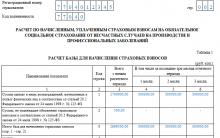
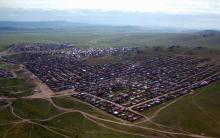
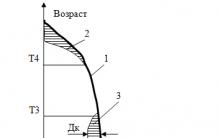
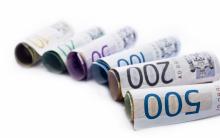
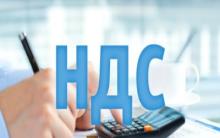
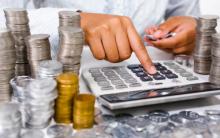




Carrying out an inventory
Ulyukaev, Navka and Patrushev
Income tax refund for treatment: registration procedure and calculation of the deduction amount
Import substitution - what is it?
OSAGO minimum insurance period